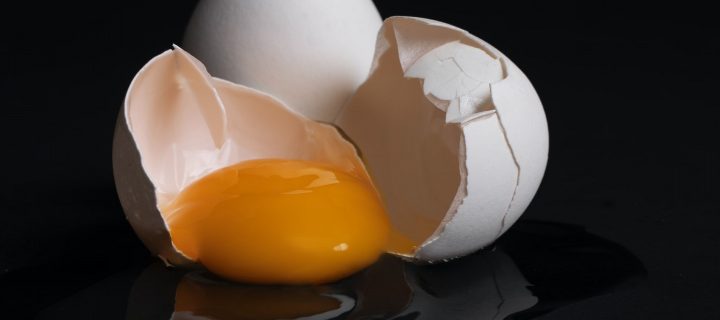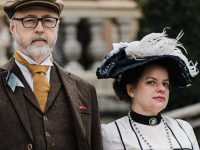JM: Now that we have more people talking about larp, a lot of people say “larp taught me that I could be another gender.” That’s a great conversation that we’ve now had a few times, so what is the next conversation? What’s next after “larp can teach me that I can be different”?
ES: I would say that it can teach you how to be different. Gender is a thing we do, and having an environment where we can actually learn — I mean, my first Inside Hamlet was the first time I ever tried to perform that specific kind of high femininity.
AN: I was thinking about skills. It can take years to feel comfortable with the most basic skills of performing the gender role that you want to be reflected as.
JM: I’m what, eight years in? And I’m finding that I don’t feel like I’m getting so much more comfortable with the skills as much as getting comfortable with feeling uncomfortable. There are definitely people and situations where I still have no idea how to interact.
ES: It gets easier. There are still things that feel weird and fraught—but there are so many things that I’ve also stopped noticing are skills; I don’t realize they’re learned anymore.
AN: But there’s also some danger to larp being talked about in this sense. How do we talk about what it is that we do? Because there’s no way to make that immune from someone saying “well, this is just an act” – reducing it to clothing and skills. We didn’t just put on the dress or the suit, we put on the skills, and they don’t want environments where people can learn these skills and become comfortable with them. They don’t want us to exist. Maybe let’s not get too depressing here, but I think that’s what is radical about larp spaces: they can be a place where you can learn.
JM: Most people don’t actually want that liberation.
ES: To that I would say they’re going to try to kill us regardless, so making ourselves smaller isn’t going to stop it. My answer to that is to ignore it, and even to be explicit about this — here is the fraught thing, and we choose to ignore it. But skills are an interesting frame because body language isn’t a skill. You’re literally restructuring your peripheral nervous system to have different kinds of reflexes, right? You could argue that performance plus time is part of physical transition.
JM: Like fluency?
ES: Deeper than that, it’s physiological.
JM: Maybe similar to the way when you start to think in a new language and react in that language – you don’t forget your original one, but for a long time they can get mixed up.
*****
SS: As a player, I find it useful to have access to queer history and other queer experiences. And to play your own oppression, because it can be very liberating to fuck with it. But as the backlash against queer people has been growing, our queer games have become more sanitized; people don’t want to play on things they experience in real life. People playing the oppressors are scared of playing the oppressors.
JM: If you can’t have the oppressors in these games, you also lose out on the possibility for liberation.
SS: Exactly, and that’s what’s been bugging me. One of the things larp can do is let us see the oppression and act against it.
AN: We have to workshop people to get them to play mean and nasty!
JM: In The Future is Straight I played the head of the conversion camp and used this very nuanced, caring kind of normative oppressor — the counselors and I would do these horrible scenes and then meet up in the kitchen to cry. But at the end I didn’t feel horrible, I felt intensely grateful to anyone who had done any of that work, who had stood up to this in the past and now. But can trans liberation and larp overlap?
ES: I mean, we know larp is a very bad tool for doing politics because it doesn’t scale. But learning history in a very deep way is one of the places where it can be useful. Like, this is what it meant to come out as trans 15 or 20 years ago. Or the fight between the leather dykes and the conventional pride ecosystem in 1980 and ‘81. Understanding how we survived previously and how we fought is a direct survival mechanism.
JM: But are the kids even interested in history yet?
ES: Larp lets us create scripts for talking across generations. We don’t really have scripts for talking to our elders because they died, or went stealth.
JM: And there’s an active campaign to prevent us from interacting with young people.
*****
JM: Sometimes I go into a larp thinking I want to consciously play with a particular part of myself, or to try something out, and to cis people it might not be a characteristic or personality that is obviously gendered, but for me it’s inescapably gendered.
ES: I mean, as a trans person, can you actually imagine a version of yourself without thinking about the gendered implications of it?
JM: No, exactly.
*****
SS: One of the reasons I larp is that sometimes when I’m larping, I can forget that I’m trans, and I crave that so much.
JM: Do you reflect yourself as cis, or do you just forget that transness is a thing?
SS: I don’t know. I forget that I am trans. Not that it exists, but the inhabitation of another character can sort of reinscribe a bodily understanding of myself.
ES: I remember that specifically from Just a Little Lovin’, this physical weirdness of interacting with my own body after the game, like wait, what is this?
JM: I’m going to take a different direction. Obviously Just a Little Lovin’ was the larp that made my omelet more than cracked my egg, and it was jarring to leave that character body, but not just the body; the way that people behaved around that body. And like, in real life when I walk into a new social situation, especially a non-queer one, I’m always looking for my failure modes and the social and gendered awkwardness have real consequences. But in a larp, people are so ready to paper over your “mistakes.” I experience some of the usual anxiety of performing in the larp, but I have a lot less anxiety about just being in a social situation at all. And I wonder if this is the liberatory element; like, I would like to live in a society where I feel like that all the time.
ES: To be in a room where you’re guaranteed a kind reading.
AN: Also something about the fact that everybody has a layer of performance.
JM: Yeah, and they know it!
ES: Everyone is aware.
JM: Because we all do this all the time.
ES: I feel like we should ask some cis people about whether they have that understanding that they’re performing all the time.
AN: They don’t!
SS: Some do, but yeah.
AN: That’s the problem! But larp is an equalizer in that way, right? That’s why there’s safety in a larp pack and why we party so well at Knutepunkt — even if you’re not trans, everyone has some kind of understanding that reality is a stack and you can play with it, and at the base layer we’re all performing something.
JM: So larp levels the playing field when it comes to the creation of the self?
ES: There’s also something about the ensemble thing, though, right? Because we’re not just aware that everyone is performing. There’s this explicit trust and co-performance relationship that’s happening. And you know that everybody kind of knows that.
AN: Everybody is performing and everybody needs to support everybody else in that performance.
ES: And if you say that you’re X, of course I’m going to take that at face value, because why wouldn’t I?
AN: That’s why it’s so hard to lie at larps; we interpret everything so kindly.
JM: And then in the real world, in the office, people are deeply invested in not doing this.
*****
SS: You said something that made me think — about making explicit the gender play in every role. That would do a lot, forcing people to think about it, because the privilege of cisness is that you don’t have to think about gender.
JM: We often write very gendered characters in the backstory, but we’re not explicit about it.
AN: And now a lot of larps now have gender-neutral casting —
JM: Not a fan.
ES: I hate it!
AN: Because all this is taken out, right?
JM: I realize I don’t really play cis characters, but I don’t really play trans characters, either. I’m just kind of this guy —
ES: I know what you mean.
JM: And it’s not gender-neutral, but it’s somehow resisting or even escaping the categories. But here’s a conversation: When you larp, is your body your body? Are your scars your scars?
SS: It’s complicated.
JM: Yeah, me too. I feel like I have a bit of a Schrödinger’s body.
SS: I mean, the facts of our bodies are by and large inescapable. We can change them but that’s not really something we do for larp. How we physically access this world is a fact, though we might experience the liminality in that particular larp moment.
ES: Obviously I acknowledge that I’m playing the character with the same body as I have otherwise, but it would never occur to me to think of any of the specificity of my body as belonging to the character. Almost like something that I have to do to play the character is to step away from the history of the body, because it’s so bound up with identity — and not just identity, but path dependency and time and interaction with gatekeepers and all of this specific body history. For me to play a character it can’t be the same body. It has to be, at the very least, read through a soft focus.
*****
JM: Could we ever make a trans liberationist larp that cis people would get?
ES: What does liberation mean?
JM: [struggling] … with this sort of idea baked into it that… I have to describe it negatively — no gatekeeping, no violence, no prejudice on the basis of a trans identity.
ES: That just sounds like freedom from oppression. That feels like a really low bar.
JM: Yeah, it does. I’m not going to fall into the trap of saying it’s liberation from gender because I like gender and I think it’s a nice flavor. But I could imagine something where fluidity is actually assumed for everyone?
ES: I don’t want to play that game.
JM: Okay, not fluidity. But I somehow want the society I would like to see modeled in a larp, though I don’t think it’s so important to model the exact society so much as get something right in the design about the interaction. Why do we interact with gender and each other in a particular way?
AN: Another answer for a trans liberatory larp would be one that’s for trans people, one that actually leaves the concerns of cis people behind. I don’t know what that looks like —
ES: Me neither, but I would play that. Trans utopia sounds nice. I’ve never played a larp that is as queer as my life is.
Cover photo: Photo by Jasmin Egger on Unsplash.
This article is published in the Knutpunkt 2022 magazine Distance of Touch and is published here with permission. Please cite this text as:
MacDonald, Jamie. 2022. “Beyond Cracking Eggs.” In Distance of Touch: The Knutpunkt 2022 Magazine, edited by Juhana Pettersson, 51-54. Knutpunkt 2022 and Pohjoismaisen roolipelaamisen seura.






